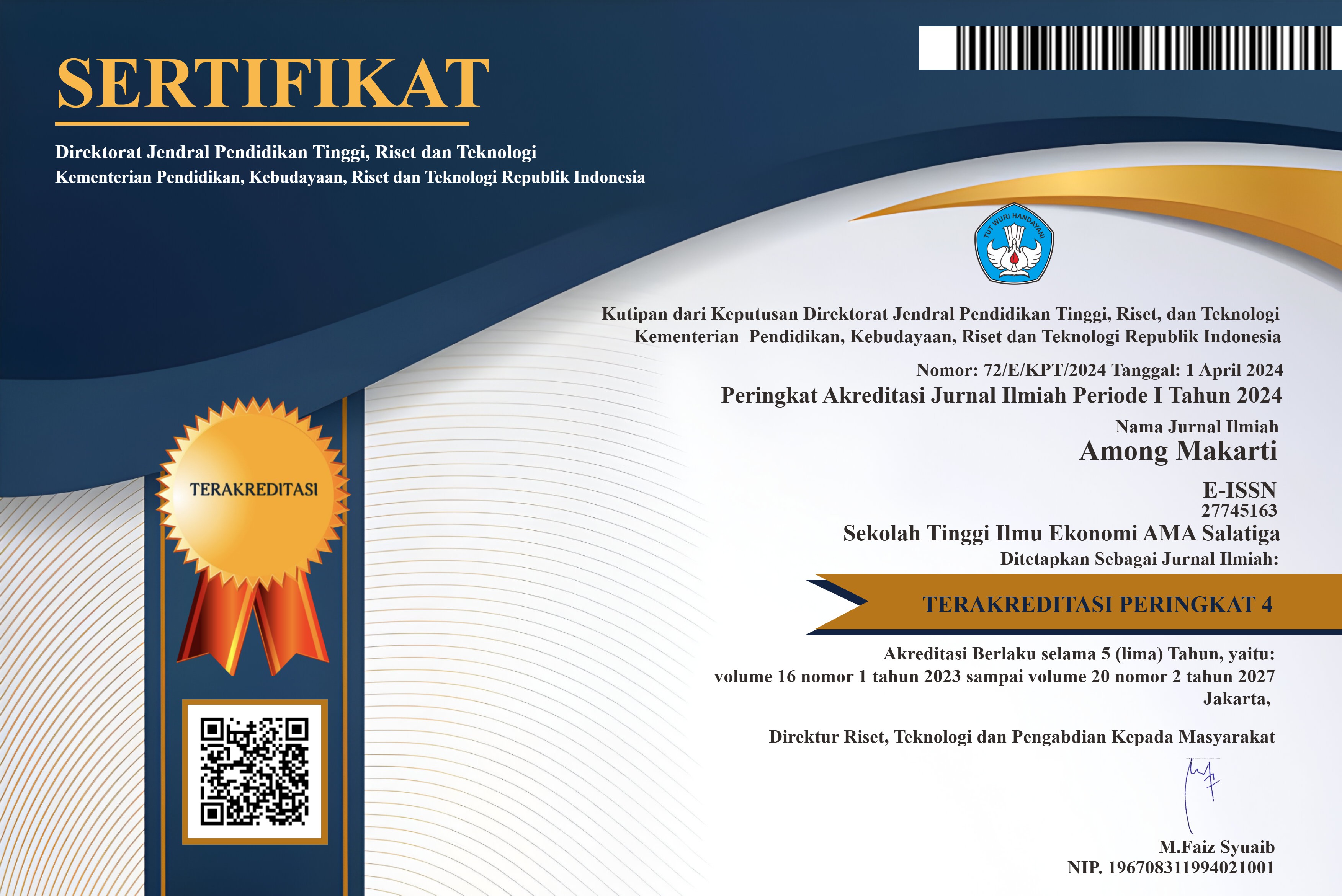PERSEPSI MAHASISWA AKUNTANSI TERHADAP INTERNATIONAL FINANCIAL REPORTING STANDARDS
Abstrak
Kata Kunci
Teks Lengkap:
PDFReferensi
Ahmed, K., and M. Alam. (2012). The Effect of IFRS Adoption on the Financial Reports of Local Government Entities, Australasian Accounting Business & Finance Journal 6(3): 109-120.
Albu, N., C. N. Albu., and M. M. Girbina. (2012). Educating Accounting Students in an Emerging Market Economy – An Analysis of the Importance of Stereotypes in Teaching IFRS, International Journal of Academic Research 4(3): 51-57.
Bandyopadhyay, J., and P. F. McGee. (2012). A Progress Report: IFRS-U.S. GAAP Convergence and Its Curriculum Impact, Advances in Competitiveness Research 20(1/2): 78-89.
Bohusova, H., and D. Nerudova. (2009). US GAAP and IFRS Convergence in the Area of Revenue Recognition, Economics& Management : 12-19.
Buys, P. W., D. Schutte., and P. Andrikopoulos. (2012). Understanding Accounting Students Cultural Diversity and Its Implication of the Interpretation of IFRS, International Business & Economics Research Journal 11(4): 451-466.
Cohen, S., and S. Karatzimas. (2012). Has IFRS Adoption Affected Management Accounting System? Empirical Evidence from Greece, Social Science Research Network Maret.
Cudia, C. P. (2009). Factors That Influence The Final Grades of Students in Managerial Accounting Course in De La Salle University, Journal of International Business Research 8(1): 39-59.
Epstein, B. J. (2008). The Economic Effect of IFRS Adoption, The CPA Journal : 26-31.
Fosbre, A. B., E. M. Kraft., and P. B. Fosbre. (2009). The Globalization of Accounting Standards: IFRS Versus US GAAP, Global Journal of Business Research 3(1): 61-71.
Girbina, M., M. Minu, S. Bunea., and M. Sacarin. (2012). Perceptions of Prepares from Romanian Banks Regarding IFRS Application, Accounting and Management Information Systems 11(22): 191-208.
Himawan, R. (2010). Persepsi Analisis Laporan Keuangan pada Perusahaan Sekuritas terhadap Penerapan IFRS Secara Penuh. (Tidak Dipublikasikan).
Ho, H. (2008). Spialing Effect of Prior Knowledge in Accounting Studies, The International Journal of Learning 15(4): 25-29.
Ionascu, M., and I. Ionascu. (2012). The Use of Accounting Information by Financial Analysts in Emergent Markets: The Case of Romania, Accounting and Management Information Systems 11(2): 174-186.
James, M. L., and C. Blaszczynski. (2010). Accounting Students Perceptions of International Financial Reporting Standards, Journal for Global Business Education 10: 37-49.
James, M. L. (2011). Integrating International Financial Reporting Standard Into Accounting Curriculum : Strategies, Benefits and Challenges, Academy of Educational Leadership Journal 15: 127-141.
Kabir, M. H., F. Laswad., and M. A. Islam. (2010). Impact of IFRS in New Zealand on Accounts and Earning Quality, Australian Accounting Review 20(4): 343-357.
Kaiser, J. G. (2012). IFRS and US GAAP: Similarities and Differences, PricewaterhouseCoopers LLP.
Kim, H. P. (2011). Investigating Perceptions Concerning the Adoption of International financial Reporting Standards (IFRS) Among College Students. Thesis. Texas Tech University.
Koh, M. Y., and H. C. Koh. (1999). The Determinants of Performance in an Accountancy Degree Programme, Accounting Edcation 8(1): 13-29.
Larson, R. K., P. J. Herz, S. Y. Kenny. (2011). Academics and the Development of IFRS: An Invitation to Participate, Journal of International Accounting Research 10(2): 97-103.
Miller, W. F., and D’A. A. Becker. (2010). Why Are Accounting Professors Hesitant to Implement IFRS?, The CPA Journal August: 63-67.
National Business Education Association. (2007). National standards for business education: What America’s students should know and be able to do in business. Reston, VA: Author.
Persons, O. (2013). A Principle-Based Case for Teaching International Financial Reporting Standards (IFRS), Global Conference on Business and Finance Proceedings 8(1): 154-157.
Rohini, D. (2011). Are Indian Investor Aware of IFRS Standards? – A Study on the Investor’s Attitude Toward the Implementation of IFRS in India, International Journal OF Global Business 4(2): 28-40.
Smith, L. M. (2012). IFRS and U.S. GAAP: Some Key Differences Accountants Should Know, Management Accounting Quarterly 14(1): 19-26.
Stivers, B. P., and E. Onifade. (2011). Knowledge, Skills, and Abilities for Accounting: An Investigation of Student Perceptions, Review of Business Research 11(1): 46-56.
Terzi, S., R. Oktem., and I. K. Sen. (2013). Impact of Adopting International Financial Reporting Standards: Empirical Evidence from Turkey, International Business Research 6(4): 55-66.
Weiss, J. M. (2011). Implementing IFRS Curriculum into Accounting Programs, The CPA Journal April: 62-63.
Zhu, H., K. T. Rich, A. R. Michenzi., and J. Cherubini. (2011). Issues in Accounting Education 26(4): 725-750.
.
DOI: http://dx.doi.org/10.52353/ama.v15i1.250
Refbacks
- Saat ini tidak ada refbacks.
Copyright (c) 2022 Paskah Ika Nugroho, Rosita Adi Kristanti

This work is licensed under a Creative Commons Attribution-ShareAlike 4.0 International License.
AMONG MAKARTI : JURNAL EKONOMI DAN BISNIS
SEKOLAH TINGGI ILMU EKONOMI AMA SALATIGA
 Jl. Diponegoro No.39, Salatiga, Kec. Sidorejo, Kota Salatiga, Jawa Tengah
Jl. Diponegoro No.39, Salatiga, Kec. Sidorejo, Kota Salatiga, Jawa Tengah
TERINDEKS :

This work is licensed under a Creative Commons Attribution-ShareAlike 4.0 International License.



























